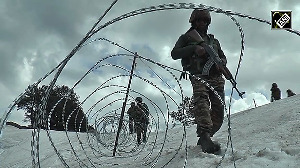The government is receiving brickbats for not putting in enough efforts to rescue 53 Indian sailors abducted by Somalian pirates. Sheela Bhatt looks at the hurdles faced while dealing with sea piracy.
The government of Egypt and Dubai has complained to India about the excessive media coverage given to relatives of the kidnapped Indian sailors by Somali pirates. According to them, the hype by the Indian media is not helping negotiators who are trying to strike a deal with pirates for the early release of the sailors.
The complaint from negotiators, on behalf of ship owners is a serious one, because apart from the Indian crew, sailors of other nationalities are also held in captivity. It's not fair to jeopardise the collective efforts of other nations to release all of them, said a government source. There are Yemenis, Ghanaians, Egyptians, Pakistanis, Sri Lankans and Sudanese sailors along with Indians who are on the five ships hijacked by Somali pirates.
According to senior sources in the government, there are 53 Indian sailors held by Somali pirates on five ships. They are MT Savina Caylyn, MV Iceberg, MV Suez, MV Sinin and MT Asphalt Venture.
In the last five years, 175 Indian crew have been taken hostage and one has been killed.
Piracy is booming off the coast of Somalia since the collapse of its government in 1991. In 2008, there were 111 attacks on ships out of which 42 were hijacked, reports the International Maritime Bureau's Piracy Reporting Centre. In 2010, Somalians kidnapped 638 sailors.
According to an expert on piracy, a Somalian pirate asks for a ransom of $2 million for releasing a captive ship. The gunmen, who are mostly unemployed youths, get $10,000 to $20,000.
Government sources said that negotiations with Somali pirates need patience. It's always a long-drawn affair and requires skill to bargain with them with the help of their community chieftain. When the media builds up pressure by highlighting the woes of the relatives of the kidnapped sailors, pirates feel they are successful in grabbing attention and try to extract more money.
Governments try to pressure negotiators to make a quick settlement to avoid negative publicity, but that's not easy. Since pirates are not terrorists they are handled differently by ship owners all over world. It's a complicated affair because no sovereign nation is ready to deal with them directly, say sources.
If pirates are contacted directly by any government it would unnecessary raise the stature of pirates. Also, the issues of insurance and maritime laws are involved in dealing with these criminals. Some reputed ships are now making provisions for a kidnap and ransom insurance of undisclosed amounts. The conditions of the insurance policy are such that if ship owners disclose any details then the insurance becomes invalid. All these factors make negotiations with pirates delicate and the media pressure is not helpful, according to negotiators.
After receiving brickbats the Indian government too is trying to avert publicity given to the hostage crisis with the hope that negotiators will succeed soon in striking a deal with the pirates.
The government is being charged for inaction by more than a dozen relatives of kidnapped sailors. The relatives of the kidnapped sailors have met Prime Minster Dr Manmohan Singh, Defence Minister A K Antony, Minister of Overseas Affairs Vayalar Ravi and Shipping Minister G K Vasan in the last week. They have also approached Leader of Opposition in the Lok Sabha Sushma Swaraj, who has been continuously tweeting and expressing her sympathy towards the kin of the abducted sailors. Swaraj also called Dr Singh and raised the issue in the Parliament. "The government should seek United Nations intervention to secure the immediate release of our children who are held hostage," she tweeted.
India is already a part of the international mechanism available to deal with piracy. The UN Security Council and International Maritime Organisation are working on ways to mitigate piracy. India is chairing the UN committee on the issue. In fact, in the Mumbai headquarters of the shipping ministry there is a 24X7 control room that gets an immediate call if any Indian ship is attacked by pirates. All ships have a covert alarm to send an SOS message. The Gulf of Eden has become the focal point of the Indian Navy's security plans due to increasing attacks by pirates.
What also needs to be highlighted is that the 53 Indian seafarers who have been abducted were sailing on non-Indian ships. If the hijacked ships belonged to India, the government could to a lot more to rescue the sailors. As per the rulebook, the negotiations are always initiated by ship owners. The Indian government can do little but supervise the process and put pressure on the ship owners through diplomatic channels. The menace caused by Somaili pirates remains the priority of the government, say sources.
In fact, world over the Indian Navy's operations in keeping Somalian pirates in check have been appreciated. Some even say that the Indian Navy has an intimidating presence in the seas near Somalia that has put a brake to the booming business. The figures prove that all ships escorted by the navy have reached their destination safely since 2008. It has thwarted more than 28 attempts of hijacking in the recent past.
A senior source from a defence establishment said, "There are more than 30 to 40 warships off the Somalian coast helping merchant vessels to cross the Gulf of Aden and enter the Indian Ocean and to sail northwards to the Persian Gulf, to reach the Indian coast or to sail towards Singapore."
China, Japan, Russia, France and the United States too provide security to their ships in this 420 nautical miles-long route, but adopt different methods. All major countries including NATO nations fully co-operate in the anti-piracy operations, said a senior government officer.
However, the ground reality is that there is a limitation for any government to deal with Somali pirates. According to the Bharatiya Janata Party leaders, the government should pay ransom, if necessary, use force and join other countries in a collective effort to secure the release of the hostages. Rajya Sabha BJP Deputy Leader SS Ahluwalia said, "We call ourselves an emerging power, but we are unable to help bring our sailors back. The government needs to take strong action to rescue the hostages."
But, these ideas may not be workable on the international platform. There is an ongoing international effort and there are certain limitations within which India has to operate. The sources pointed out that the Cabinet committee on security which met to discuss the kidnapping of Indians and the issue of piracy was told that there is no Indian law to deal with piracy. The new law will be introduced or the existing law will be amended on a fast track, say sources.
The biggest problem is the political anarchy in Somalia. Recently, India has shown its maritime power by destroying three ships of pirates, have captured over 50 pirates and have escorted over 1,500 vessels including 300 Indian-flagged vessels. But, the international community, including India is aware that the piracy problem is far from over.










 © 2025
© 2025